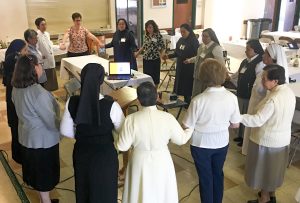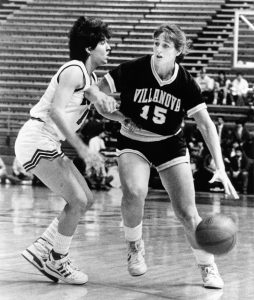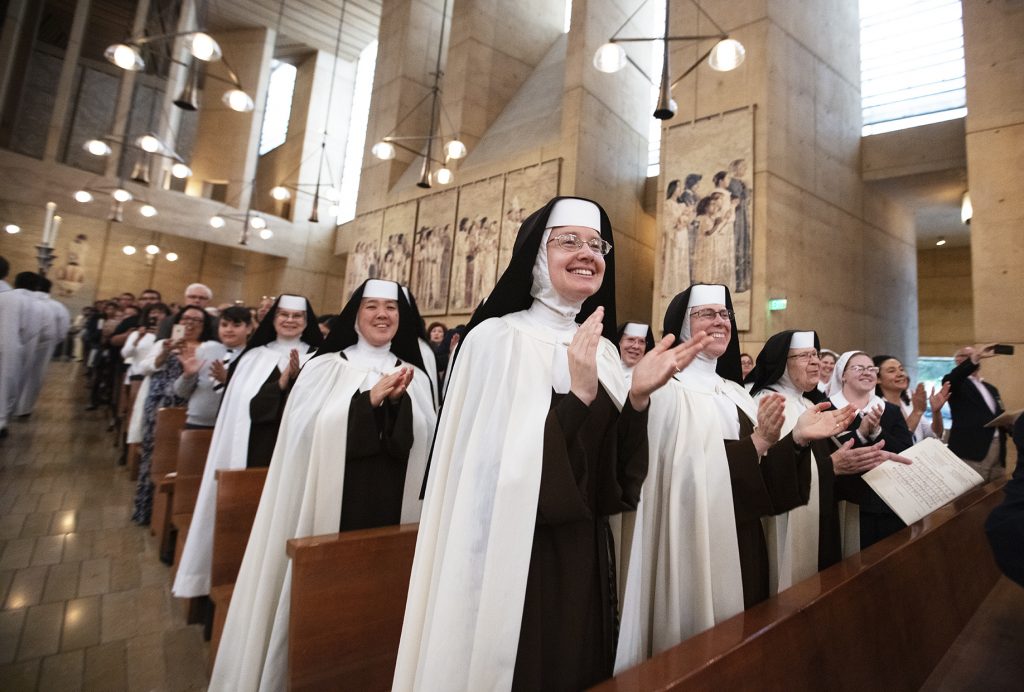I’ll never forget the promo for the Oprah Winfrey Show that stopped me in my tracks.
In February 2010, Oprah advertised an episode featuring behind-the-scenes footage of women whose lives were mostly hidden from the world.
Lisa Ling, who did some investigative journalism for the show, decided that one group she would get to know would be the Dominican Sisters of Mary, Mother of the Eucharist, a growing order of women religious (with a decreasing median age) in Ann Arbor, Michigan.
The interviews from that first episode were so captivating that Oprah had the sisters back for a second episode and reconnected with the community again in 2015.
The promo opened with Oprah’s signature dramatic voice overlaying b-roll footage of the sisters walking around the convent: “They will never have sex. They will never own possessions. They will never have money of their own for the rest of their lives.”
Despite the ominous opening, Oprah displayed a genuine desire to understand why so many young women were choosing this way of life. I was delighted by the moments in which she found common ground with the women religious, even if she used different language to describe a shared experience or point of view.
The sisters’ effusive joy, as well as their prioritization of silence, contemplation, and community life, shifted the conversation from what they gave up to what they gained. Several young women later shared with Oprah that they traced their decision to enter religious life to that first interview.

I’ve been thinking of those episodes in light of the recent cluster of stories about nuns in the news, mostly notably the in-depth look at millennial women discerning the religious life in the Huffington Post, and the ESPN story about a star Villanova University basketball player who gave up a promising professional athletic career to live as a cloistered Poor Clare nun.
Nearly 10 years later, after Oprah introduced the world to the faces and stories of young women entering the convent, the phenomenon remains intriguing, and somewhat puzzling, to many people.
The common question that emerges from reporters and the voices in the comment boxes is the same as Oprah’s: Given the manifold opportunities that contemporary young women have, how is it that the number of millennial women discerning religious life, and those signing up for a set of select traditional communities, is on the rise?
WHAT IS GOING ON?

Perhaps the sub-headline of the Huffington Post article put it more bluntly, asking, “What on earth is going on?”
To get at that answer, it’s helpful to look at the social and economic landscape for millennial women in general, and how they are responding to it, regardless of vocation.
According to a 2017 article in The Fiscal Times, nearly 60 percent of all college students are women, meaning that their prospects for employment are increasingly good.
And a recent U.S. Census Bureau analysis revealed that as more young women obtain college degrees, delay having children, and join the workforce, they are getting better paying jobs than their male peers at a rapid rate.
Millennial women are also able to enter into fields once dominated by men, including finance, technology, engineering, and entrepreneurship.
When you add to this the data demonstrating a general upward trend of women landing executive and leadership positions in Fortune 500 companies as well as political office, the facts are clear: Millennial women have nearly every door opening to them for professional success, economic stability, and upward mobility.
While this is certainly great news, the phenomenon simultaneously creates a cultural expectation, and a very real kind of pressure, for young women to walk through these doors, often at the expense of other goals or goods such as personal relationships or sustained self-reflection and discovery.
Let’s look at the situation of professional, educated women thinking of the vocation to marriage and motherhood. A 2013 study entitled “Knot Yet: The Benefits and Cost of Delayed Marriage in America,” took a deep dive into the marriage and childbearing decisions of men and women in their 20s and 30s.
They found that women who delay marriage until age 30 enjoy an annual income premium and have more professional opportunities available to them than those who marry earlier. This is sold as a one-size-fits-all, unequivocal good.
There are also growing incentives for women to stay in the workforce after having children. In a recent issue of National Review, author Patrick Brown looked at how public policy advocates are overwhelmingly working to help working mothers stay in the labor force and climb the economic ladder, while next to no policies incentivize or reward women who want to work part-time or stay at home with their children.
Yet according to a 2012 Pew Research Center poll, only 32 percent of mothers with young children wanted to work full time, and 47 percent of all working moms said their ideal situation would include part-time work.
To get off the conveyor belt, for a period of time or permanently, demands a level of self-possession, courage, and a willingness to be mistakenly perceived as ungrateful for the barriers that have been broken by previous generations.
It also requires wrestling with the purpose of one’s education and the value of professional accomplishments in light of other possibilities.
WOMEN WALKING AWAY

Now, look at the accomplished, educated women interviewed about their decision to enter the convent. Villanova basketball star Shelly Pennefather walked away from a $200,000 contract in Japan which, according to the ESPN article, “would have made her one of the richest players in women’s basketball” in the 90s.
Just consider her stats: Pennefather scored 2,408 points, Villanova’s all-time record for women and men, which she still holds today. And, the author noted, “she did it without the benefit of the 3-point shot.”
Eve Fairbanks, author of the Huffington Post piece, observed the following about millennial discerners’ credentials:
“[T]he aspiring sisters aren’t like the old ones. They’re more diverse: Ninety percent of American nuns in 2009 identified as white; last year, fewer than 60 percent of new entrants to convents did. They’re also younger: The average age for taking the final step into the religious life a decade ago was 40. Today, it’s 24.
“They’re disproportionately middle children, often high-flying and high-achieving. Typical discernment stories on blogs or in the Catholic press start with lines like, “She played lacrosse and went to Rutgers” or she was “a Harvard graduate with a wonderful boyfriend.”
In fact, one Harvard student, Mary Anne Marks, was the 2010 valedictorian. Her plan after graduation? Join the Dominican Sisters of Mary, Mother of the Eucharist. “When people hear Harvard to the convent they think, ‘You are giving up a lot of opportunities,’ ” she said.
It would stand to reason that what millennial women have been offered — economic stability, independence, and technology at their fingertips — should be making them happier. But are they? Share on XIt would stand to reason that what women in their 20s and 30s have been offered — economic stability, sexual choice and independence, and technology at their fingertips — should be making them happier. Money, sex, and personal possessions: These are the things that Oprah noted women religious give up.
And yet we see is what scholars have called the “paradox of declining female happiness” emerge as women’s rights and gains have increased. It’s not only nuns who are dissatisfied with the material, sexual, and economic offerings in front of them, it’s women across the board.
Sister Mary Catherine told Oprah that she walked away from her career and felt freedom. “I had a cellphone, PDA, a laptop. Laptops are supposed to make you ‘mobile.’ It was the biggest ball and chain of my life. I was so happy to be rid of it!” And of a life of celibacy, another sister shared, “I feel like I’ve reclaimed my sexuality in an oversaturated, sexualized world.”
Two recent studies out of Harvard Divinity School and the Fetzer Institute that traced the phenomenon of religious disaffiliation, called “How We Gather” and “Something More,” revealed that millennials are searching for meaning and belonging in a variety of spaces, particularly those that offer them the following: community, personal transformation, social transformation, purpose-finding, creativity, and accountability.
While some are finding fulfillment in “spiritual-but-not-religious” spaces like Soul Cycle, others have bucked the trend of disaffiliation from institutional religion and found their way to the Catholic Church, embracing its traditions and precepts along with its opportunities for personal and social change.
Within that cohort, 13 percent of millennial Catholic women between 18 and 35 have said that at one point they have thought of becoming a religious sister. Community, joy, personal transformation — these are all palpable in the communities featured by Oprah, ESPN, and the Huffington Post.
‘KNOWING WHO WE ARE’
At a recent event at Boston College (where I work), Father Matt Malone, president and editor-in-chief of America Media, said this:
“People ask me, ‘What do we do to promote vocations?’ You live them joyfully. To find that truth that lies at the heart, that comes from the One who is Truth, that can only bring about joy, is needed more than ever. I don’t mean a giddy happiness. I mean knowing who we are and helping other people to become what they are called to be.”
The rather pressing mission for Catholics, then, is to find every opportunity to encourage conversation around purpose, vocation, and meaning with young people, since they are desperately looking for it.
Back in 2010, Oprah mused, “I’ve been thinking about how people move through the world without ever taking a moment to think about the power that’s greater than themselves.” One of the sisters responded, “If you don’t believe in anything greater than yourself, you’ll never do anything greater than yourself.”
When it comes to millennial women, we should encourage them to pursue every opportunity for greatness. But we should also be prepared that it might just lead them to the most surprising places, including the convent.
Correction: A previous version of this article cited a "2013 Pew Research Center poll" that found that "only 7 percent of mothers with young children wanted to work full time. "
The poll in question was conducted in 2012, the correct figure is 32 percent of mothers, not 7 percent. The article has been updated to reflect the correct information.

